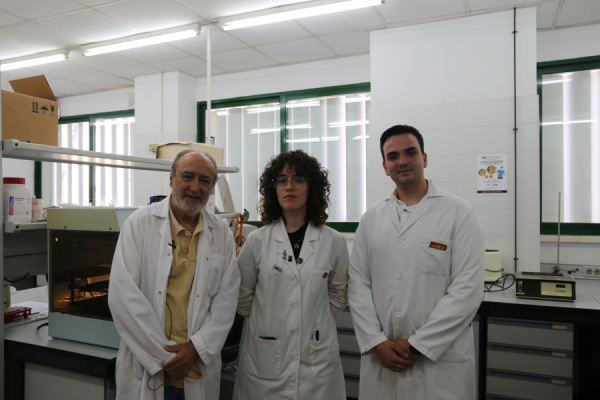The excessive consumption of nitrites is linked to negative health effects. Hence, a new European regulation limits their amounts in different foods. One of them is Iberian pork loin, which has traditionally used nitrites and salt as preservatives. By reducing these elements, will it be possible to continue enjoying this product's properties? Yes, there is an alternative and it is in the pork loin itself.
A decade ago, a team in the University of Cordoba's Microbiology Area, led by Professor José Ramos, isolated a collection of yeasts that developed inside the loin during its maturation process. They found that these microorganisms impacted the characteristics of the final product. Now, one of the strains of that yeast family, Debaryomyces hansenii LRC2, stands as an alternative to maintain the properties of Iberian pork loin through nitrite and salt reduction. "We have seen that, through the application of this yeast, we can prevent other unwanted microbes from appearing," explained José Ramos, confirming that this yeast results in enhanced food safety for the pork loin, and longer shelf lives.
This strain's potential was evaluated in the laboratory by means of a volatile compound inhibition assay. These volatile compounds are responsible for the pork loin's aroma, but they are also capable of inhibiting fungi that can harm the product. "In that phase we tested the yeast with a fungus, face to face, without them touching, and the fungus grew less. We saw that, without touching it, the inhibition of the fungus occurred, " explained the first author of the work, Helena Chacón.
This protection of the yeast was verified in the final product, which was then inoculated with a battery of Iberian pork loins from the Navalpedroche company, located in the Valle de los Pedroches, a valley recognized for the quality of its meat products. "In this process, as it is industrial work, the ISO standards for food quality and microbiology were observed," noted researcher Francisco J. Ruiz.
According to the researcher, "using this yeast, in particular, allowed us to lower the levels of nitrite and salt, and maintain food safety and the characteristics of the Iberian pork loin. At the flavor level, however, we did not fully meet the market's needs. "
It is true that the crux of the matter is the product's taste. Although the specialized panelists and regular consumers who tried the Iberian pork loin with fewer preservatives and inoculated with the yeast reported that "it was good," the scores they gave it were lower.
Thus, having managed to preserve the pork loin's characteristics, and increased its shelf life, as well as having adapted it to European standards by lowering its nitrites and salt, the pending task is to improve the taste. To do this, the team is working with other complementary strains to maintain 100% of the Iberian pork loin's flavor.
This work was carried out by a multidisciplinary team with staff from the departments of Agricultural Chemistry, Edaphology and Microbiology; Bromatology, Analytical and Statistical Chemistry, Econometrics, Operations Research, Business Organization and Applied Economics.
Reference
Chacón - Navarrete, Helena & Gómez, Marcos & Cardador, María & Dorado, José & Ruiz Pérez-Cacho, Pilar & Roldán-Casas, Jose& Arce, Lourdes & Galán Soldevilla, Hortensia & López, Bibiano & Ramos, Jose& Ruiz Castilla, Francisco Javier. (2024). The antimycotic potential of DebaryomyceshanseniiLRC2 on Iberian Pork Loins with low concentration preservatives. Food Control. https://doi.org/10.1016/j.foodcont.2024.110632


